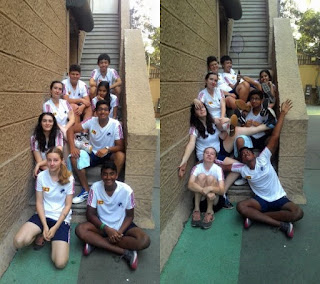~ "What feels like the end is often the beginning." ~
Creativity
For this final year I tried to limit my after school activities in order to focus more on my academics and this reflected especially on those to do with Creativity. As opposed to last year, where I was a part of the SGA and the Drawing Club, this year I was only able to attend Piano Lessons on a regular basis and Art Club on a semi-regular basis. While Art Club was used as an excuse to relax and unwind while doing something I enjoy, like drawing, learning to play piano was more structured and allowed me to Develop new skills as well as to Show perseverance and commitment in my activities due to having attended the lessons for 2 years or so.
(Photo credit: OSC)
Action
In keeping with my goal of trying to focus more on my studies this year, I was not as involved with all of the sports I enjoy playing, although I did try out for an entirely new sport and so Undertook a new challenge. My main focus in Action this year was to try to get a leadership position for one of my teams and I achieved this for Volleyball. Another overall goal for action was to Increase awareness of my own strengths and areas of growth as well as to Work more collaboratively with others. Aside from Volleyball, the only other SAISA sport that I was on the team for was Badminton, which was a new experience for me. I had never played before trying out, except briefly in PE a few years back, but enjoyed the game and playing with my teammates, as well as playing individually which took some getting used to as I usually play in team sports. After Badminton in the second quarter I opted not to go to SAISA for Football but still attended practice to keep in shape and because I do love playing the game.
(Photo credit: Ms Lockwood)
For Service this year I wanted to join an entirely different group from Alzheimer’s Awareness which I was a part of last year, and so I picked a new group called the Checkmates. As this was a new group however, we all had some say in Planning and initiating activities, although not as much as the service leaders. The main goal of the group was to teach less fortunate kids from other schools how to play chess, which is highly beneficial for building academic skills and recreational purposes, both of which lend to Engagement with issues of global importance, as it is a universally acknowledged game and to the Consideration of the ethical implications of our actions, specifically relating to the people we meet and affect.
(Photo credit: Checkmates service group)






